BELGRADE, Serbia — Kosovo is well known for the war and consequent NATO campaign against Serbia. Armed conflict ended in 1999, and the forces of the Western alliance took control of the Serbian province, where they maintain a fragile peace over the area.
Tuesday, the young state celebrated seven years of independence, but a fancy and expensive ceremony is not going to be seen this year. Spend Ahmeti, mayor of Pristina, explained that due to a lack of money there has been a massive exodus of Kosovar citizens, an event that started in the beginning of 2015.
Albanians from Kosovars are often seen all over Western Europe. Most of them are hard working and stay away from crime, but some are notorious for organized control of drug trafficking, human trafficking,and other illicit activities.
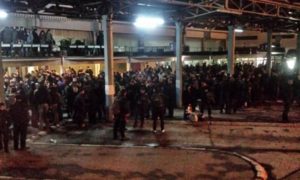 For many years, poverty and instability drove them, just like members of many other nations, towards the West. And this flow was constant and balanced, legal or illegal. But from December last year, numbers have dramatically increased, topping up to 18,000 immigrants from Kosovo registered in Germany in January alone.
For many years, poverty and instability drove them, just like members of many other nations, towards the West. And this flow was constant and balanced, legal or illegal. But from December last year, numbers have dramatically increased, topping up to 18,000 immigrants from Kosovo registered in Germany in January alone.
Every night, dozens of busses are packed with people carrying light luggage only. A 50-seat bus often takes 150 people on board. Whole families, with children and bare essentials, are starting the trip to the unknown. Dramatic pictures have waved through the world, photos and videos showing masses of Balkans on their way to Europe.
And, of course, many theories have been offered, many reasons given for the exodus. As someone who was in the country for 15 years, working with UN and EU missions, I see this as the only way toward a brighter future for those involved, fully aware that such a future is not waiting for them in Kosovo.
The United Nations maintained peace and showed presence, but failed to fight corruption and some UN officials were even found to be involved in it. The EU came in with great ideas and an even greater budget, but results were hardly visible. A system has been built, but corrupted. Many laws and regulations passed the Assembly; however, their implementation is yet to be seen. The highest local officials are involved in a series of illegal activities. Low-scale corruption is widely present and is an everyday experience.
There is now a proven record of a much higher rate of cancer in the region, often explained with regards to the bombing campaigns and the usage of depleted uranium for anti-armor ammunition.
On top of everything, a full day’s wage on a construction site (10 to 12 hours) is five to six Euros. And those that get such a job are happy; there is a long queue of people waiting for one.
Kosovo is now poorer for hundreds of thousands of Serbs; they all fled to Serbia proper, having safety as a priority in life. Pristina, the capital of Kosovo, had a pre-war population of 40,000 Serbs — counting few dozen these days.
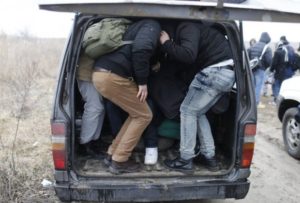 This sudden and massive outbreak of immigrants is obviously organized, since there is no war conflict now. Poverty was there last summer as well. Most likely, organized crime has a huge interest in this. They are the ones trafficking people across borders and away from police patrols. Those that can’t pay will be in debt and pay later, but more. There are established prices for safe passage through certain critical areas. The rumour is borders are to be closed; a new war in Macedonia and a possible conflict with the Serbian minority, etc, initiated the exodus. Many of them reported intimidation, suffered from Wahabi activists recruiting fighters for Syria. And if people have nothing to lose, they will resort to desperate measures.
This sudden and massive outbreak of immigrants is obviously organized, since there is no war conflict now. Poverty was there last summer as well. Most likely, organized crime has a huge interest in this. They are the ones trafficking people across borders and away from police patrols. Those that can’t pay will be in debt and pay later, but more. There are established prices for safe passage through certain critical areas. The rumour is borders are to be closed; a new war in Macedonia and a possible conflict with the Serbian minority, etc, initiated the exodus. Many of them reported intimidation, suffered from Wahabi activists recruiting fighters for Syria. And if people have nothing to lose, they will resort to desperate measures.
European countries are facing the problem with great concern; these numbers are too high, especially when combined with those coming from Syria, Africa and other places. Austria has organized direct flights for repatriation purposes only. Hungarian and Serbian police are working together, trying to prevent thousands of illegal crossing attempts every single night.
A stable economy and personal prosperity in a safe environment are the only conditions required for people of any nation to stay put and abandon any idea of risky change.
Analysis by Miroslav Velimirovic
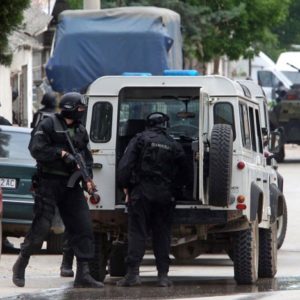 Kumanovo is a small town in northern Macedonia. This state is widely known for its long-lasting dispute with Greece, which has been unwilling to recognize their name due to historical reference.
Kumanovo is a small town in northern Macedonia. This state is widely known for its long-lasting dispute with Greece, which has been unwilling to recognize their name due to historical reference.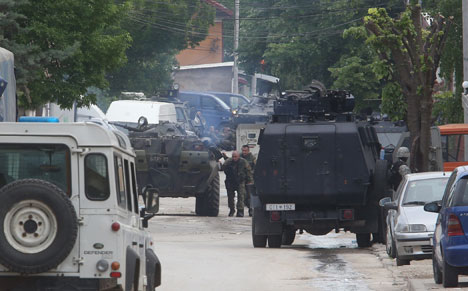
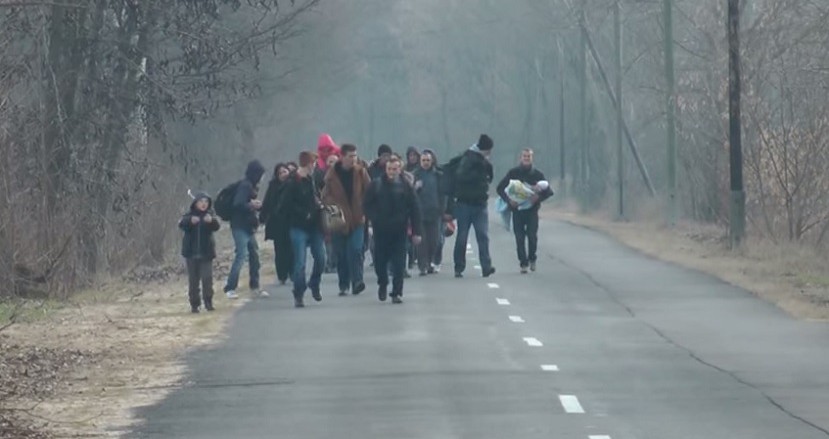
 For many years, poverty and instability drove them, just like members of many other nations, towards the West. And this flow was constant and balanced, legal or illegal. But from December last year, numbers have dramatically increased, topping up to 18,000 immigrants from Kosovo registered in Germany in January alone.
For many years, poverty and instability drove them, just like members of many other nations, towards the West. And this flow was constant and balanced, legal or illegal. But from December last year, numbers have dramatically increased, topping up to 18,000 immigrants from Kosovo registered in Germany in January alone. This sudden and massive outbreak of immigrants is obviously organized, since there is no war conflict now. Poverty was there last summer as well. Most likely, organized crime has a huge interest in this. They are the ones trafficking people across borders and away from police patrols. Those that can’t pay will be in debt and pay later, but more. There are established prices for safe passage through certain critical areas. The rumour is borders are to be closed; a new war in Macedonia and a possible conflict with the Serbian minority, etc, initiated the exodus. Many of them reported intimidation, suffered from Wahabi activists recruiting fighters for Syria. And if people have nothing to lose, they will resort to desperate measures.
This sudden and massive outbreak of immigrants is obviously organized, since there is no war conflict now. Poverty was there last summer as well. Most likely, organized crime has a huge interest in this. They are the ones trafficking people across borders and away from police patrols. Those that can’t pay will be in debt and pay later, but more. There are established prices for safe passage through certain critical areas. The rumour is borders are to be closed; a new war in Macedonia and a possible conflict with the Serbian minority, etc, initiated the exodus. Many of them reported intimidation, suffered from Wahabi activists recruiting fighters for Syria. And if people have nothing to lose, they will resort to desperate measures.
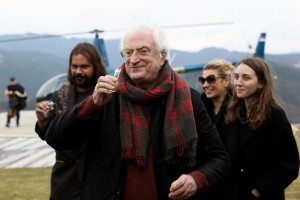 with two films that have won the Palme d’Or at the Cannes Film Festival. Once he said, “Every time I’m shooting a movie I want to kill myself. Because I don’t see the light in the end of the tunnel.”
with two films that have won the Palme d’Or at the Cannes Film Festival. Once he said, “Every time I’m shooting a movie I want to kill myself. Because I don’t see the light in the end of the tunnel.”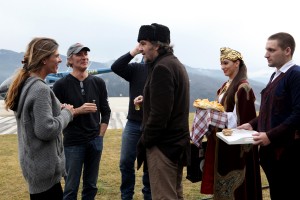 Kusturica continues with his wonders, so he built Drvengrad (Wooden City) in Mećavnik, Serbia. Drvengrad is a whole village made of natural materials, mainly wood and stone, creating a magical structure of traditional architecture and new artistic trends.
Kusturica continues with his wonders, so he built Drvengrad (Wooden City) in Mećavnik, Serbia. Drvengrad is a whole village made of natural materials, mainly wood and stone, creating a magical structure of traditional architecture and new artistic trends. Starting in 2008, this place has hosted the Kustendorf movie and music festival, creating a chance for young directors and actors to meet their older and globally famous colleagues. Over the years, many eminent actors and directors have visited the festival; we will mention only few of them: Nikita Mikhalkov, Jim Jarmusch, Johnny Depp, Isabelle Huppert, Monica Belucci, Andrei Konchalowski, Alfonso Cuarón, Bertrand Tavernier…
Starting in 2008, this place has hosted the Kustendorf movie and music festival, creating a chance for young directors and actors to meet their older and globally famous colleagues. Over the years, many eminent actors and directors have visited the festival; we will mention only few of them: Nikita Mikhalkov, Jim Jarmusch, Johnny Depp, Isabelle Huppert, Monica Belucci, Andrei Konchalowski, Alfonso Cuarón, Bertrand Tavernier…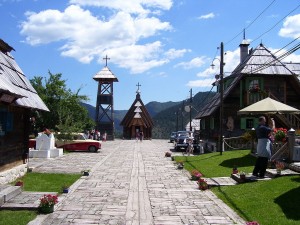 There is also an award handed out for films yet to be made…
There is also an award handed out for films yet to be made…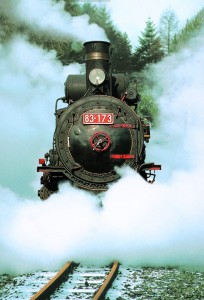 village of Mokra Gora (549 residents), just under Drvengrad. The railway was active from 1925 to 1974, connecting Belgrade with Adriatic Sea. Rebuilt in recent years, it is a tourist attraction now. Many visitors are here to experience the joy of the steam engine whistle and a cowboy-style coach. Unlike other parts of Serbian Railways, everything is in order here. The train starts when scheduled and arrives on time.The coach is clean, personnel dressed properly. Old train, old engine, new rails. A long time ago, this was a very convenient way to travel from Sarajevo to Belgrade. Now, another section of old railway has been reconstructed and will connect Višegrad with Kremna. The total length of the planned railway is around 50 kilometers. The entire area is 245 km away from Belgrade and another 136 from Sarajevo. Only half an hour away from Mecavnik, there are another two mountains, Tara and Zlatibor, both offering attractive tours and decent hotels.
village of Mokra Gora (549 residents), just under Drvengrad. The railway was active from 1925 to 1974, connecting Belgrade with Adriatic Sea. Rebuilt in recent years, it is a tourist attraction now. Many visitors are here to experience the joy of the steam engine whistle and a cowboy-style coach. Unlike other parts of Serbian Railways, everything is in order here. The train starts when scheduled and arrives on time.The coach is clean, personnel dressed properly. Old train, old engine, new rails. A long time ago, this was a very convenient way to travel from Sarajevo to Belgrade. Now, another section of old railway has been reconstructed and will connect Višegrad with Kremna. The total length of the planned railway is around 50 kilometers. The entire area is 245 km away from Belgrade and another 136 from Sarajevo. Only half an hour away from Mecavnik, there are another two mountains, Tara and Zlatibor, both offering attractive tours and decent hotels.